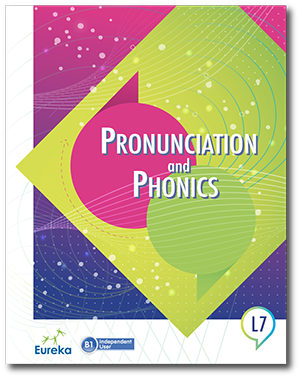All | Kindergarten Programmes | Primary School Programmes | Secondary School Programmes

Course Name: English Pronunciation and Phonics Level 7
Level: Secondary 1 – Secondary 2
No. of Lessons: 10 (Suggested)
Lesson Duration: 1 hr 30 mins (Suggested)
Instructors: Native English teachers with a university degree ; related teaching experience, and/or teacher training such as TEFL, TESOL, CELTA, PGDE/PCEd, etc.
Objectives
This course aims at improving students’ pronunciation using the synthetic phonics system. By the end of the course, students will be able to
- break down words into syllables
- locate any prefixes and suffixes in unfamiliar words
- pronounce and spell simple words by breaking down into phonemes
- differentiate similar sounding words
- pronounce common mispronounced words correctly
- stress multi-syllable words correctly
- pronounce words that have –ed and –s/-es endings accurately
Features
Essential concepts for English pronunciation such as phonemes, graphemes, syllables, parts of speech, word stress and affixes are introduced along with often confused pairs of vowels and consonants.
In this course, students will not only have plenty of opportunities to practise sample dialogues, poems and stories, they will also have chances to brainstorm words with target sounds and produce pieces of composition of their own.
Outline
Unit 1: Vowels and Consonants
-
- A. Vowels versus consonants
a. Article ‘a’ or ‘an’
b. Article ‘the’ - B. Phonemes, syllables and word stress
- C. The pronunciation of -s/-es endings
- D. Target sounds
a. Part 1: /e/ and /a/ sounds (bed versus bad)
b. Part 2: Short /oo/ and long /oo/ sounds (book versus boot)
- A. Vowels versus consonants
Unit 2: English Words
-
- A. The basic structures of English words
Prefixes and suffixes - B. Suffixes and word stress
- C. Target sounds
a. Part 1: /i/ and /ee/ sounds (fit versus feet)
b. Part 2: /o/ and /or/ sounds (pot versus port)
- A. The basic structures of English words
Unit 3: Consonant-Vowel Linking
-
- A. Linking words together
a. Consonant-Vowel Linking - B. Target sounds
Part 1: /f/ and /v/ sounds (fine versus vine)
Part 2: Two ways to pronounce ‘th’ in English
Part 3: /f/ and /th/ (unvoiced) sounds (fin versus thin)
Part 4: /d/ and /th/ (voiced) sounds (dough versus though)
- A. Linking words together
Unit 4: -ed Endings
-
- A. The pronunciation of –ed endings
- B. Prefixes and word stress
- C. Target sounds
Part 1: /ai/ and /ie/ sounds (trail versus trial)
Part 2: /oi/ and /ou/ sounds (boy versus bough)
Unit 5: Silent Consonants
-
- A. Silent consonants
a. Part 1: Silent ‘b’
b. Part 2: Silent ‘k’
c. Part 3: Silent ‘w’ (e.g. wrong, wrap) - B. Target sounds
Part 1: /s/, /sh/ and /zh/ sounds (sore versus sure)
Part 2: /ch/ and /j/ sounds (cheap versus jeap)
- A. Silent consonants
Unit 6: Heteronyms
-
- A. Heteronyms
(bow(a weapon) versus bow(to bend the body)) - B. Parts of speech and word stress
(increase(n.) versus increase (v.)) - C. Target sounds
Part 1: /oa/ and /ou/ sounds (coach versus couch)
Part 2: /ear/ and /air/ sounds (pier versus pear)
- A. Heteronyms
Unit 7: Vowel-Vowel Linking
-
- A. Linking words together
a. Vowel-Vowel Linking
b. Consonant-Consonant Linking - B. Target sounds
Part 1: /pr/ and /pl/ sounds (praise versus place)
Part 2: /br/ and /bl/ sounds (brew versus blue)
- A. Linking words together
Unit 8: Homophones
-
- A. Homophones (knead versus need)
- B. Schwa sound (offend, about, above, control, letter, carrot)
Unit 9: Rhythm
-
- A. Rhythm
- B. Target sounds
Part 1: /p/ and /b/ sounds (pin versus bin)
Part 2: /fr/ and /fl/ sounds (free versus flea)
Part 3: /tr/ and /dr/ sounds (true versus drew) - C. Commonly mispronounced words
Unit 10: Foreign Words
-
- Foreign words
- Commonly mispronounced words
